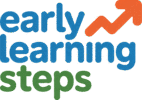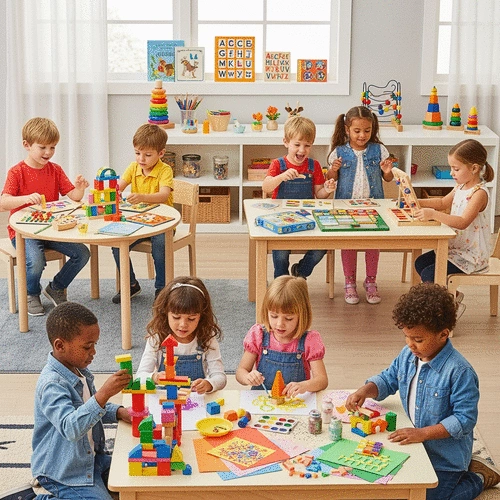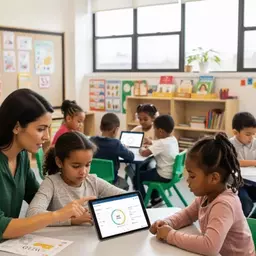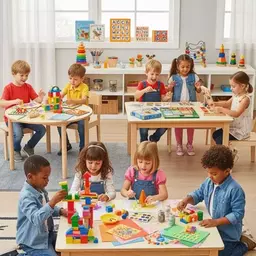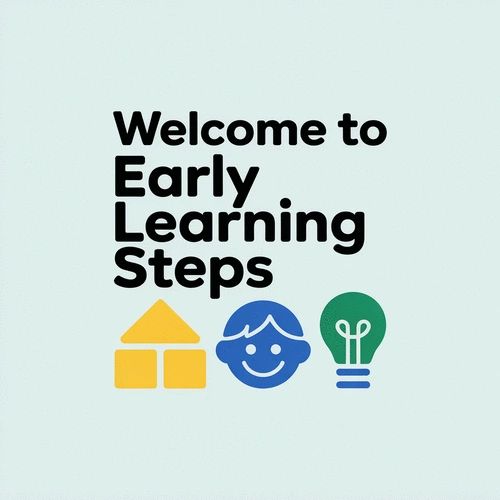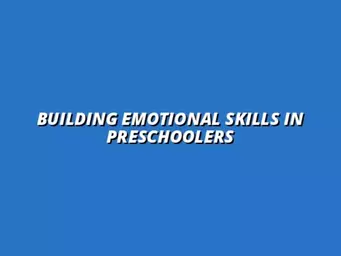What if the key to unlocking a child's full potential lies in their ability to play? Research shows that play-based learning can enhance cognitive, social, and emotional development, setting the stage for lifelong success. Educators, it’s time to embrace this transformative approach in your classrooms!
What You Will Learn
- Play-based learning fosters child-led exploration, enhancing curiosity and imagination.
- Integrating play into education supports cognitive, social, and emotional development.
- Children engaged in play-based learning demonstrate improved motivation and enthusiasm.
- Early childhood educators play a crucial role in creating safe, stimulating environments for exploration.
- Differentiated instruction within play-based settings allows for personalized learning experiences.
The Pillars of Play-Based Learning: Core Principles, Benefits, and Educator's Role
Play-based learning is a foundational approach in early childhood education. It encourages exploration and organic learning, driven by a child's natural curiosity. This approach not only helps in fostering cognitive growth but also supports holistic development. Below, we highlight its key components, the advantages it offers, and the essential part educators play in its success.
Core Principles
- ✓ Child-led exploration
- ✓ Integrated learning domains
- ✓ Flexible environments
Key Benefits
- ✓ Enhanced cognitive development
- ✓ Improved social skills
- ✓ Increased motivation
Educator's Role
- ✓ Designing engaging activities
- ✓ Creating stimulating environments
- ✓ Monitoring progress through play
Next Steps & Resources
- ✓ Books & articles
- ✓ Online courses & workshops
- ✓ Community & forums
Understanding the Importance of Play-Based Learning in Education
At Early Learning Steps, we believe that play-based learning is not just important—it's essential for the growth and development of young minds. This approach emphasizes the role of play as a foundational element in education, allowing children to explore, discover, and engage with their world in meaningful ways. But what exactly does play-based learning entail, and why should educators champion it? Let’s dive in!
Play-based learning is defined as an educational strategy where children learn through play, utilizing their natural curiosity to drive their learning experiences. It’s about creating environments where exploration is encouraged, and learning happens organically. This method is not only favored by young learners but also recognized by many educators as a vital part of early childhood education, helping in building crucial social skills.
Defining Play-Based Learning: What Educators Need to Know
To fully embrace play-based learning, we need to understand its core principles. At its heart, this approach involves:
- Child-led exploration that nurtures curiosity and imagination.
- Integration of various learning domains, such as cognitive, social, and emotional development.
- Flexible learning environments that adapt to children's interests and needs.
Understanding these elements helps educators create lessons that resonate deeply with students. The magic of play lies in its ability to transform ordinary learning into extraordinary adventures!
Benefits of Implementing Play-Based Approaches in Classrooms
Integrating play-based methods has incredible benefits for children’s education. Some of the most notable advantages include:
- Enhanced cognitive development: Through play, children develop critical thinking and problem-solving skills.
- Improved social skills: Collaborating with peers during play fosters communication and teamwork.
- Increased motivation: Children who engage in play-based learning are often more enthusiastic about their educational journey.
These benefits not only support academic performance but also contribute to the holistic development of children, preparing them for future challenges. It’s all about fostering an environment where they can thrive!
The Role of Early Childhood Education in Promoting Play-Based Learning
Early childhood educators play a pivotal role in championing play-based learning. By incorporating play into their curricula, they lay the groundwork for lifelong learning. This includes:
- Designing activities that integrate play into various subjects.
- Creating safe and stimulating environments that promote exploration.
- Monitoring and assessing children's progress through play-based interactions.
As someone who is deeply passionate about early childhood education, I’ve seen firsthand how effective play can be in capturing children’s hearts and minds. It’s about more than just play; it’s about crafting experiences that inspire learning and growth!
Interactive Poll: Your Thoughts on Play-Based Learning
How do you feel about implementing play-based learning in your educational approach? Share your thoughts with us!
Summarizing the Key Aspects of Implementing Play-Based Learning
As we reflect on the journey of integrating play-based learning into education, it becomes clear that the benefits for both children and educators are profound. Play-based learning fosters an environment where children feel safe to explore and express their creativity, which is vital in their early development. It not only enhances cognitive skills but also nurtures emotional and social growth.
Here are some essential benefits and strategies that educators can embrace:
- Encourages critical thinking and problem-solving skills.
- Supports emotional intelligence and social interaction.
- Enhances engagement and motivation through interactive learning experiences.
- Provides opportunities for personalized learning based on children’s interests.
By understanding these aspects, educators can effectively implement play-based methods that cater to the unique needs of their classrooms. Remember, it’s about creating a space where every child can thrive!
Encouragement for Educators to Embrace Play-Based Practices
To my fellow educators, I urge you to embrace the magic of play in your classrooms! Transitioning to a play-based learning approach may seem daunting at first, but the rewards are worth it. Imagine a classroom buzzing with excitement, where children are actively participating and learning through discovery.
Here are some encouraging tips for incorporating play-based practices:
- Start small by integrating play into your daily routines.
- Collaborate with other educators to share resources and ideas.
- Engage families by sharing the benefits of play-based learning.
As you embark on this journey, remember that you're not alone. Each step taken towards play-based education is a significant stride in enhancing the learning experience for your students! Consider exploring effective play strategies for learning to further enrich your teaching methods.
Next Steps for Implementing Play-Based Learning in Your Classroom
Now that we've explored the importance and benefits of play-based learning, let’s discuss actionable next steps. Implementing these strategies in your classroom can lead to exciting transformations for both you and your students.
Here are some valuable resources to consider:
- Books and articles on play-based education and child development.
- Online courses and workshops focused on innovative teaching strategies.
- Local community groups or online forums where you can connect with like-minded educators.
Utilizing these resources can help bolster your understanding and application of play-based methods, making your classroom even more vibrant and engaging.
Exploring Differentiated Instruction Techniques in Play-Based Settings
One of the beauties of play-based learning is its inherent flexibility, which allows for differentiated instruction. By tailoring your approach to meet diverse learning needs, you can ensure that every child has the chance to shine. This differentiation can occur through various activities that cater to different learning styles, whether visual, auditory, or kinesthetic.
Consider these techniques:
- Create learning centers that focus on different skills and interests.
- Allow children to choose their play activities based on their interests.
- Utilize peer mentoring, where older or more knowledgeable students guide their peers.
By implementing these strategies, you foster an inclusive environment that celebrates each child's unique strengths and learning journeys.
Call to Action: Join a Community of Play-Based Educators
I invite you to connect with the vibrant community of play-based educators! Engaging with others who share your passion can provide support, inspiration, and new ideas. At Early Learning Steps, we believe in the power of collaboration in enriching educational experiences.
Whether through social media platforms, professional organizations, or local meet-ups, seek out opportunities to exchange ideas and challenges. Together, we can create enriching play-based environments that nurture curious and confident learners.
Let’s inspire one another to continue making a difference in the lives of our students!
Frequently Asked Questions About Play-Based Learning
What is play-based learning?
Play-based learning is an educational approach where children learn through engaging in play activities. It leverages their natural curiosity to foster exploration, discovery, and organic learning experiences across various developmental domains.
What are the core principles of play-based learning?
The core principles include child-led exploration, which nurtures curiosity and imagination; the integration of various learning domains (cognitive, social, emotional); and flexible learning environments that adapt to children's interests and needs.
What are the key benefits of implementing play-based approaches?
Key benefits include enhanced cognitive development (critical thinking, problem-solving), improved social skills (communication, teamwork), and increased motivation and enthusiasm for learning.
What is the role of an educator in play-based learning?
Educators play a pivotal role by designing engaging activities, creating safe and stimulating environments that promote exploration, and monitoring children's progress through play-based interactions.
How does play-based learning support differentiated instruction?
Play-based learning supports differentiated instruction through its inherent flexibility, allowing educators to tailor activities to meet diverse learning needs. This can involve creating learning centers, allowing choice in activities, and utilizing peer mentoring to cater to different learning styles and strengths.
